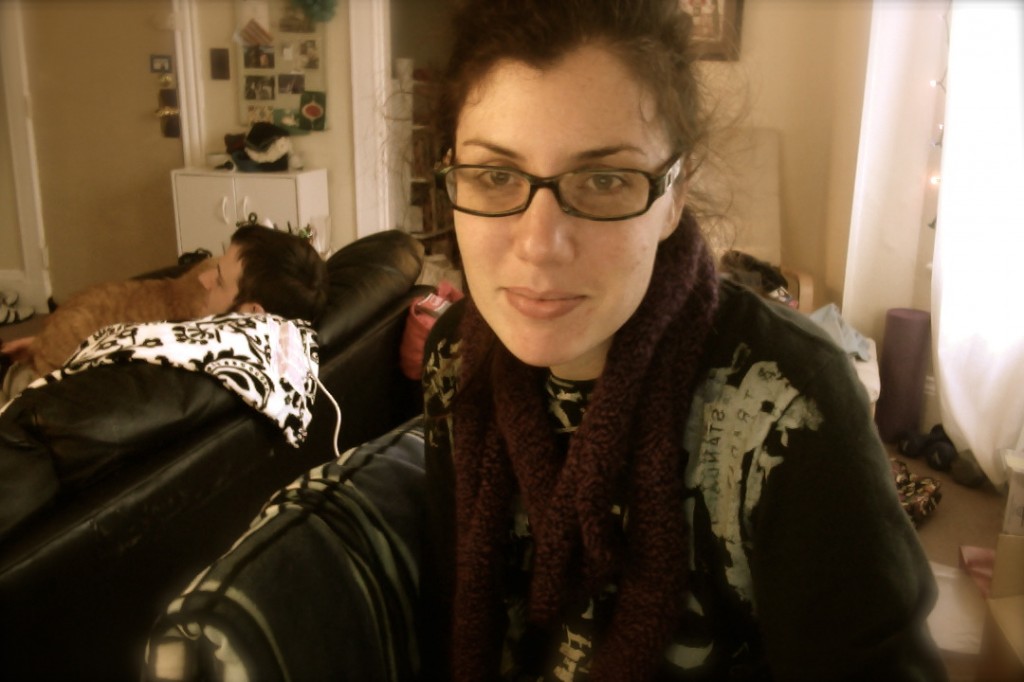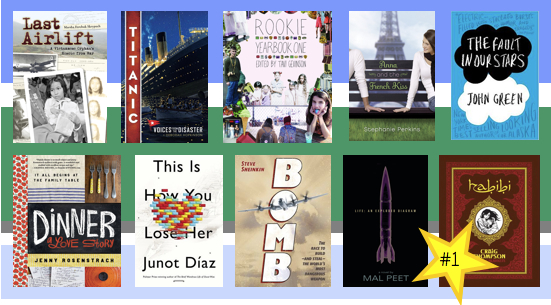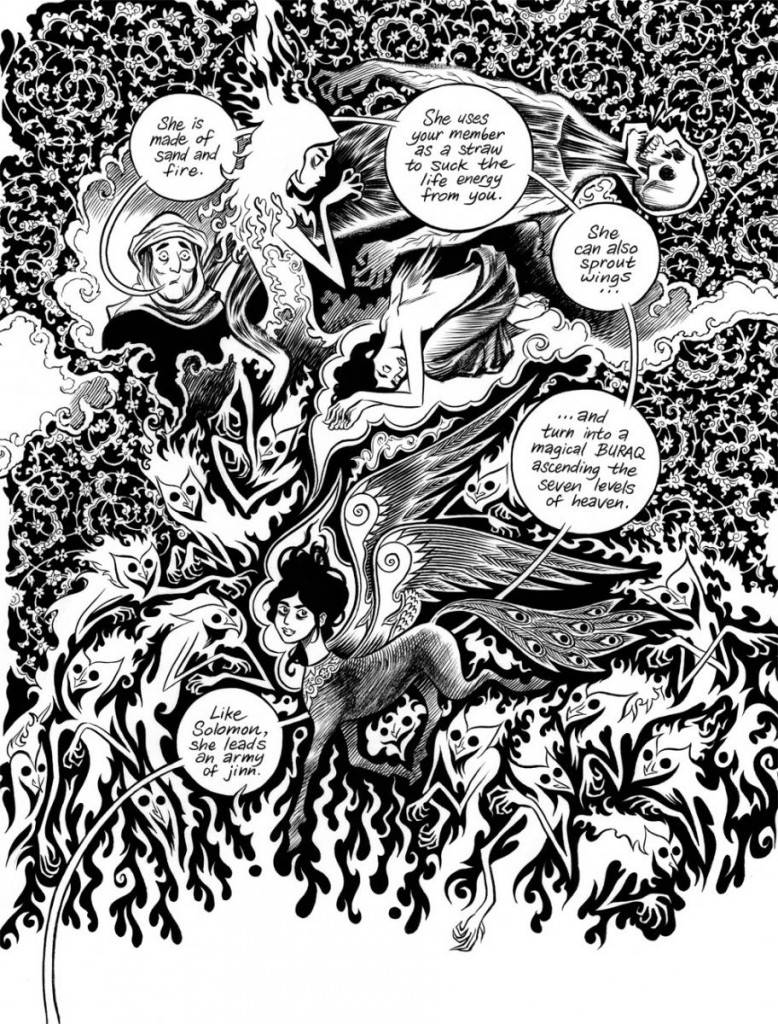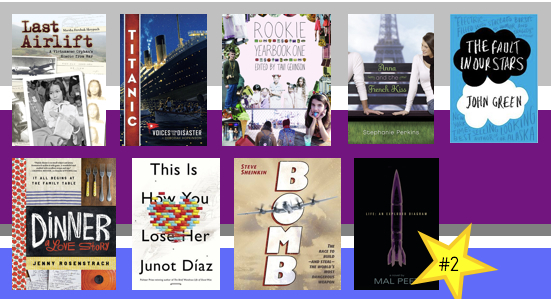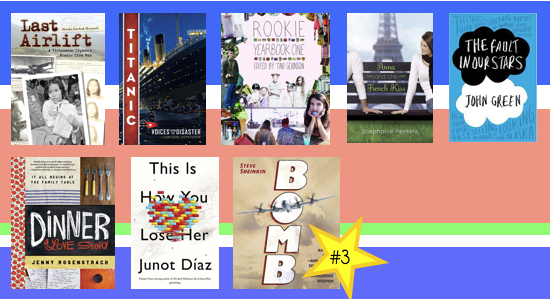As I have told you time and time and time again, 2012? Ridiculous year. I hope down to my bones that I will never have another year like it. Everything I predicted on January 3rd came true, except for becoming unemployed – I hung onto that one last part-time job until the bitter end. Stress has done a good job of casting a haze over my memories of 2012, but here are some things I would like to remember.
1
A Sunday in January, I worked my usual noon to four reference desk shift. I was probably wearing my exercise clothes under my regular clothes. There were friends going to a bar to watch the game, but I skipped out because I hate football and because I wanted to go to the gym. The college gym on a Sunday early-evening is a quiet place, but more so when the Patriots are playing in the Superbowl. Only half of the overhead lights had been switched on, and I had the tiny indoor track to myself. I listened to This American Life and ran three (very slow) miles for the first time in my life. Then I took a last lap and made it a 5k.
Then a security guard locked me into campus in fear of Superbowl related riots, but let’s just hang on to the first part of that night.
2
A Tuesday in February, I worked my usual four to nine reference desk shift. The Boy picked me up from work and when we made it home, he asked me to marry him. I said yes. Of course I will remember this.
But after that, there was this period of time – a week, two weeks, I can’t quite remember – when we didn’t tell a soul. The ring needed to be sized, we needed to tell parents and family before Facebook – all of these logistical reasons, but also I couldn’t wrap my head around it. I was getting married. I am getting married. After eight years, a ring on my finger.
Those few weeks were a little bubble of excitement. On a day off, The Boy surprised me at work, delivering the re-sized ring and a large Marylou’s coffee. I wore it to my internship the next day because I knew nobody would ask. We talked about it only to each other. We spent an entire hour trying to figure out how to announce such a thing on Facebook on afternoon, and then we went to see The Hunger Games. Now I don’t notice this ring on my finger, I am doing stuff like premarital counseling, I refer to The Boy as “my fiance” from time to time, and it all seems quite normal, but for those few weeks, it was a strange new secret that only existed in our apartment, in our car, when we were together.
3
I started looking at jobs in late February and got excited about a few positions that seemed ideal. I polished up my resume and wrote cover letters, and a month after applying, I had heard nothing. By March, I wasn’t in the I-hate-myself dregs of job hunting yet, but the experience had certainly lost its luster.
One job in particular had caught my overachieving eye early in the job hunting phase. Not a job, but a fellowship, for children’s services, in one of the best public libraries in the country. Two year commitment, make 50K annually plus health insurance, stipends for ALA… but first, an appropriately rigorous application process. In February, I was geeked. By March, I was appalled. How many essay questions? No more than FIVE letters of reference?? A video??? Ugh.
A certain library someone sent me a link to the posting later in March. To him I said, “Ugh, that application sounds atrocious and I hate the world and how will I even get 5 LETTERS of reference before the deadline?”And he said back, “Well, you just ask for them.”
Oh. Well.
So I asked, I muscled through the essays, recorded a video, over-nighted my application packet, and a few days later, I got a Skype interview.
I did not get the job and I’d rather forget about that interview, honestly, but it was a nice boost at the beginning of my search, and really was an honor just to be considered.
4
One thing that is frustrating about growing up semi-privileged/growing up in a recession/growing up period is that despite what you have wished for, hoped for, and had been promised, successes are rarely straightforward. This simple transaction – work hard, produce something that shows your skills, and then be rewarded? This doesn’t happen that often.
Except that this year it happened to me. I took an unpaid internship. I showed up twice a week and did menial tasks. The interns were all asked to write a book review for the two publications. I wrote mine and submitted it on time. It was well-received and I was asked to stay on as a reviewer for both.
Obviously, there are other factors that led to this chain of events (see: writing XXX words about books here, for school, for other purposes over many years, paying to attend a particular Master’s program, having the relative luxury/insanity to work for free at an internship for a semester), but in the end, I wrote it, it was good, I got my reward.
5
After a weekend of being touristy, a day of walking all over town and hitching charter buses and pinning hoods on graduation robes and deciding who would drive where with who and when, after walking across a graduation stage, so many of the people I loved gathered together from far, far away to sit with me and eat at Legal Seafood.
There was a bottle of wine. Life was good.
6
In late July, I took my 25-minute lunch break in the Starbucks across the street from my retail job. Things were not going well. I had a rotten commute. My days off were spent finishing up things at my other job, or going out on job interviews. I was getting job rejections. It was hot. I sweat through my work t-shirts every day. I wasn’t particularly good at the kind of retail I was expected to be good at. I started eating foods mindlessly in a way I hadn’t for years. I had no idea where I was going to live come September 1st. I was stressed.
I wrote a sad plan to myself in my little journal, there in the Starbucks with my iced coffee. I was about to go on a two week vacation – maybe I should give my two weeks when I get back, we can find a dirt-cheap place to live nearer to where The Boy’s new job, maybe out of town, and I can find another part-time job. There are other part-time jobs. Keep applying for library jobs. Slice the budget as close as you can. Defer loans. A sad plan, but at least I wouldn’t have to sit in a Starbucks in a sweaty t-shirt on a twenty-minute lunch break any more. There would be an end to this particular brand of misery.
I wrote it, then finished my shift and after, there was a voicemail on my phone. It was a job offer. The Job I Wanted job offer.
I gave my two weeks the next day, took my vacation, and when I came back, started this life that I am living now.
7
I have told you all about the books that have shaped my year, but I will also remember 2012 as the year of the podcast, of Adele’s 21, of Hunger Games the movie, of Breaking Bad, Pitch Perfect, and Skyrim.

